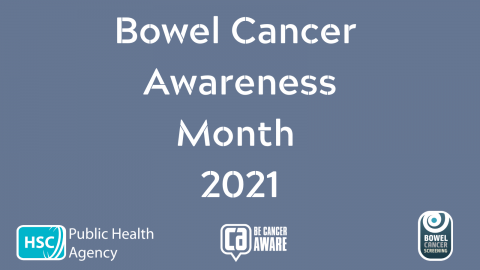Detecting bowel cancer early saves lives

April is Bowel Cancer Awareness Month and the Public Health Agency (PHA) is using this opportunity to raise awareness of signs and symptoms and encourage people to take part in the screening programme when invited.
“Over 1,000 people are diagnosed with bowel cancer each year in Northern Ireland,” said Dr Christine McKee, Public Health Registrar at the PHA.
“Bowel cancer is the second most common cause of cancer death among people in Northern Ireland. About 1 in 20 people will develop bowel cancer in their lifetime and it is more common in older people, particularly men. It is important that people are aware of the signs and symptoms of bowel cancer, and also that they take part in screening when invited, even though they may have no symptoms at that time.”
Possible symptoms of bowel cancer can include:
• blood in your poo;
• looser poo, pooing more often and/or constipation;
• a pain or lump in your tummy;
• feeling more tired than usual for some time;
• losing weight for no obvious reason;
Dr McKee continued: “It is important if anyone experiences any of these symptoms for three weeks or more that they make an appointment with their GP. These symptoms do not mean that someone has bowel cancer but it is important that these are investigated to try to find the cause.
“Aside from acting on symptoms if they appear, it is also important to accept the invitation to participate in bowel cancer screening if you receive it. Screening can save lives by detecting bowel cancer as early as possible, giving treatment the best chance of working, so don’t delay if you are sent the test kit.”
In Northern Ireland, bowel cancer screening is offered to everyone aged 60–74. The screening test is posted out with step-by-step instructions on how to complete it. Once completed, you return the kit in the supplied return envelope in the post.
A new test kit, which is easier to complete and has the potential to detect more bowel cancers and adenomas (lesions that may develop into cancer if not treated), was recently introduced into the bowel cancer screening programme in Northern Ireland. This Faecal Immunochemical Test (FIT) has replaced the Faecal Occult Blood (FOB) test.
The FIT test is better at detecting traces of blood, which is how the screening programme identifies people who need further tests.
Dr McKee explained: “The introduction of FIT testing in Northern Ireland is an important step forward for bowel cancer screening, and will help save even more lives from this disease.
“With FIT testing in place, we can now get even more accurate readings through screening, which in turn will help provide earlier diagnosis.”
There are also steps everyone can take to reduce their risk of bowel cancer, in addition to participating in the screening programme:
• Eat a healthy diet. Make sure you get five portions of fruit and vegetables each day, and include wholegrains, beans and pulses for fibre. Limit the amount of red meat you eat, especially processed red meat.
• Be active. Moving more and sitting less can reduce your risk of serious illness. Aim for at least 2 and a half hours each week.
• Maintain a healthy weight. Avoid gaining weight and try losing weight if overweight.
• Drink less alcohol. To keep risks to a low level, don’t drink more than 14 units of alcohol a week.
• Stop smoking. Your local free Stop Smoking Service can help - find them at
For more information about cancer signs and symptoms visit www.becancerawareni.info
For more information about bowel cancer screening visit www.nidirect.gov.uk/articles/bowel-cancer-screening
